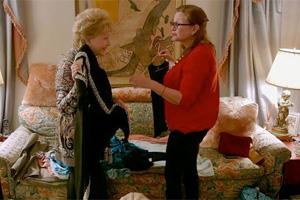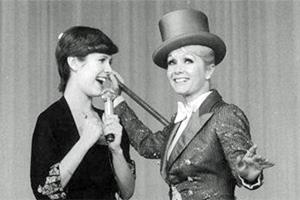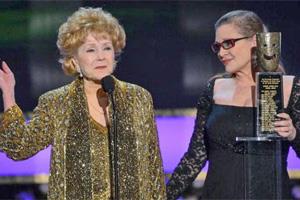It’s highly unfortunate, to say the least, that startling events prompted HBO to move up the premiere of this intimate documentary. It’s also commendable to do so.
Originally scheduled for a March airdate, the 90-minute Bright Lights: Starring Carrie Fisher and Debbie Reynolds can be seen for the first time on HBO at 8 p.m. ET on Sat., Jan. 7. Directed by Alexis Bloom and Fisher Stevens, it earlier received deservedly positive reviews at several prominent film festivals.
Fisher died at age 60 on Dec. 27 and an inconsolable Reynolds expired the next day at age 84. They thoroughly come alive in this instant classic about show biz addiction and rejection.
The daughter, best known as Princess Leia in Star Wars, still smokes, mainlines non-diet Coca-Colas, battles bouts of manic-depression and for the most part remains unfailingly sardonic. Her mom, famously jilted by husband Eddie Fisher in favor of Elizabeth Taylor, was from the old show biz school. A smile was her umbrella and keeping up appearances has been a way of life ever since her formative years at MGM Studios.

They were a decidedly odd couple, but also made for one another. Carrie lived next door to her mother and increasingly doted on her. “I usually come to her. I always come to her,” she says in the film’s early minutes while delivering one of her homemade soufflés from a very eclectically furnished home.
Debbie gradually came to understand her daughter’s demons and accepted her rebellious nature. She became a Mommie Dearest without any of the Joan Crawford trappings.
Bright Lights deftly sets the stage in the opening sequence.
“Hello. We’re here with a woman who alleges to be my mother” and has the home movies to prove it, Fisher says.
Happy together shots of mom, little Carrie and her littler brother, Todd, accentuate the positives -- because Debbie literally has the negatives.
“You have to try to concentrate on the fact that you did have sometimes -- good times,” she tells Carrie.
“I know that I did,” she retorts. “I had a very good time!”
To which Debbie has the perfect playful answer: “See how you yell -- at your muh-thuh.”
The film has “moments” in abundance. Film clips of Reynolds underscore what an appealing Hollywood persona she had -- and not only in Singin’ In the Rain. She could never quite give up her sequins or her public. And so Fisher both grudgingly and gladly accompanied mom on impulsive road trips to venues such as Connecticut’s Mohegan Sun resort and casino. The decidedly elderly faithful still turned out in large numbers to hear her sing “Tammy” and joke about her bad choices in men.
“I should have married Burt Reynolds,” she says. “I wouldn’t have to change my last name. And we could share wigs.”
She always wanted Carrie to showcase her voice as a stage performer. And her own voice still breaks, offstage, when talking about how great her kid sings.

“My mother wants me to be an extension of her wishes -- an extension of her,” Carrie says.
As a teenager, Fisher occasionally would join her mother onstage. In an old clip, she belts out “Bridge Over Troubled Water,” an eerie foreshadowing of her brief marriage to Paul Simon, of whom little is said in the film. No mention at all is made of Debbie’s third husband, Richard Hamlett, whom she divorced in 1996.
Carrie reluctantly gave in to what she calls “lap dances” that traded on her enduring fame as Princess Leia. She’s shown signing autographs for $70 a pop at fan shows before doing some pricier “photo ops.” But people clearly think those are small prices to pay, and Fisher seems willing to sign anything and everything while agreeably bantering.
There’s never a dull moment, really. Even brother Todd makes his presence felt, both by showcasing his tell-a-story sequence of framed movie posters and by noting “it’s important that you marry inside the entertainment ‘race.’ “
His wife, Catherine Hickland, formerly married to David Hasselhoff, is a peripheral actress whose credits include three episodes of Knight Rider. She now owns both a car from the show and a chicken as a carry-around pet. Fisher and Reynolds prefer the more traditional company of inseparable dogs.
Carrie eventually made peace with her dad, Eddie Fisher, an admitted louse of a father who preferred drugs to the company of his children. She’s shown at his bedside three months before his death in 2010. Eddie bears no resemblance to the matinee idol he once was. He’s just an infirm, lonely old man.
“I became his parent, and it was a way to have a relationship,” she says. Decades earlier, his leaving of Debbie for Liz was dubbed “Hollywood’s Most Shameful Story” in a magazine headline.
Reynolds later renewed her friendship with Taylor and even bought the makeup chair she used in Cleopatra as part of her multi-million dollar collection of show biz memorabilia. She sought to preserve Hollywood’s past in a grand museum, but could never find a financial backer. The collection finally was auctioned off, with Debbie still torn about parting with the Rat Pack wardrobe she’d assembled. “I love having my ghosts,” she says tellingly. “And I love having my memories.”

There’s also a particularly haunting quote from Carrie, who tells her manicurist during a rough patch, “You know what’d be so cool? To get to the end of my personality and just like, lay in the sun.”
In 2014, Carrie had to help her mother every step of the way on the night she received the Screen Actors Guild’s Life Achievement Award. Reynolds was shaky and intermittently confused. Carrie made the introductory speech and then got her through the rest of it.
The closing minutes of the film find them celebrating at Reynolds’ home during the Christmas season. Debbie is still aglow at receiving such an honor. Carrie sings to her. Mom’s last words off-camera -- “You know I love you” -- also mark the end of Bright Lights.
It’s a long way from Postcards From the Edge, which Fisher wrote in 1987 before Shirley MacLaine and Meryl Streep played approximations of Debbie and Carrie in the 1990 film adaptation. It likewise had a happy ending, but also a number of fractious moments between them during Fisher’s full-blown addiction to drugs.
Bright Lights is a much better way to remember them. It wasn’t supposed to double as a requiem, but who knew at the time?
Email comments or questions to: unclebarky@verizon. net